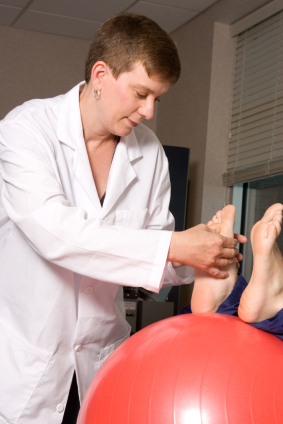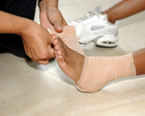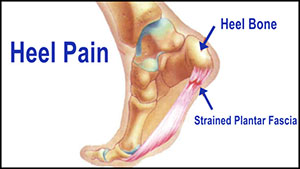Blog
Podiatrists Treat the Foundations of Our Bodies
 Foot bone and joint doctors, otherwise known as podiatrists, are knowledgeable in treating ailments of the ankles and feet. They also specialize in foot surgery and treat disorders and diseases. According to tnp.sg, “the feet and ankles have a complex connection of bones and strong ligaments that allow us to stand, pivot, twist, tiptoe, and push off.” This means that our feet and ankles are especially prone to injuries and wear and tear, so it’s important to get our feet checked out by a podiatrist regularly.
Foot bone and joint doctors, otherwise known as podiatrists, are knowledgeable in treating ailments of the ankles and feet. They also specialize in foot surgery and treat disorders and diseases. According to tnp.sg, “the feet and ankles have a complex connection of bones and strong ligaments that allow us to stand, pivot, twist, tiptoe, and push off.” This means that our feet and ankles are especially prone to injuries and wear and tear, so it’s important to get our feet checked out by a podiatrist regularly.
If you are experiencing pain in the feet or ankles, don’t join the stubborn majority refusing treatment. Feel free to consult with Dr. Michael E. Newman of Pennsylvania. Our doctor will assist you with all of your foot and ankle needs.
What is a Podiatrist?
Someone would seek care of a podiatrist when they have suffered a foot injury or have common foot ailments such as: heal spurs, bunions, arch problems, deformities, ingrown toenails, corns, foot and ankle problems etc.
Podiatric Treatment
A podiatrist will treat the problematic areas of the feet, ankle or lower leg by prescribing the following:
- physical therapy
- drugs
- perform surgery on lower extremity fractures
- orthotic inserts or soles
A common podiatric procedure a podiatrist will use is a scanner or force plate which will allow the podiatrist to know the designs of orthotics. Patients are then told to follow a series of tasks to complete the treatment. The computer will scan the foot a see which areas show weight distribution and pressure points. The podiatrist will read the analysis and then determine which treatment plans are available.
If you have any questions please feel free to contact our offices located in Plymouth Meeting and Ambler, PA. We offer the newest diagnostic tools and technology to treat your foot and ankle needs.
Obesity Associated with Diabetes is Bad News
 Diabetes, known as “a chronic disease affecting numerous organ systems,” including our feet, can both be caused and lead to various health issues. Obesity can also contribute greatly to diabetes, altering metabolism and further leading to “the deposition of carbohydrate products in the smallest arteries called arterioles.” Arterioles can block blood supply and result in various complications. Diabetics also suffer from peripheral neuropathy, which can make it hard to recognize any serious injuries or pain in the feet. It’s important to see a doctor to properly diagnose and address your condition.
Diabetes, known as “a chronic disease affecting numerous organ systems,” including our feet, can both be caused and lead to various health issues. Obesity can also contribute greatly to diabetes, altering metabolism and further leading to “the deposition of carbohydrate products in the smallest arteries called arterioles.” Arterioles can block blood supply and result in various complications. Diabetics also suffer from peripheral neuropathy, which can make it hard to recognize any serious injuries or pain in the feet. It’s important to see a doctor to properly diagnose and address your condition.
Diabetic foot care is important in preventing foot ailments such as ulcers. If you are seeking treatment, consult with Dr. Michael E. Newman of Pennsylvania. Our doctor will assist you with all of your foot and ankle needs.
Diabetic Foot Care
Diabetes affects millions of people every year. Diabetes can damage blood vessels in many parts of the body, including the feet. Because of this, taking care of your feet is essential if you have diabetes, and having a podiatrist help monitor your foot health is highly recommended.
The Importance of Caring for Your Feet
- Routinely inspect your feet for bruises or sores.
- Wear comfortable shoes that provide adequate support.
Patients with diabetes should have their doctor monitor their blood levels because blood sugar levels play such a huge role in diabetic care. Monitoring these levels on a regular basis is highly advised.
It is always best to inform your healthcare professional of any concerns you may have regarding your feet, especially for diabetic patients. Early treatment and routine foot examinations are keys to maintaining proper health, especially because severe complications can arise if proper treatment is not applied.
If you have any questions please feel free to contact our offices located in Plymouth Meeting and Ambler, PA. We offer the newest diagnostic tools and technology to treat your foot and ankle needs.
High Schoolers More Prone to Foot Injuries from Popular Sports Such As Basketball
 According to the Consumer Product Safety Commission, high schoolers, from the ages of 13 to 17, are more prone to foot injuries from certain sports. Some popular sports, such as basketball and soccer, are the most likely to lead to injuries in the ankle area. Other sports, such as lacrosse and volleyball, had a notable distinction between the ratio of male to female injuries. The reported list includes other popular sports such as softball, baseball, hockey, tennis, skiing, and more.
According to the Consumer Product Safety Commission, high schoolers, from the ages of 13 to 17, are more prone to foot injuries from certain sports. Some popular sports, such as basketball and soccer, are the most likely to lead to injuries in the ankle area. Other sports, such as lacrosse and volleyball, had a notable distinction between the ratio of male to female injuries. The reported list includes other popular sports such as softball, baseball, hockey, tennis, skiing, and more.
Sports related foot and ankle injuries need proper treatment before players can go back to their regular routines. If you have any concerns, consult with Dr. Michael E. Newman of Pennsylvania. Our doctor will assist you with all of your foot and ankle needs.
Sport Related Foot and Ankle Injuries
Foot and ankle injuries are a common occurrence when it comes to athletes of any sport. While many athletes dismiss the initial aches and pains, the truth is that ignoring potential foot and ankle injuries can lead to serious problems. As athletes continue to place pressure and strain the area further, a mild injury can turn into something as serious as a rupture and may lead to a permanent disability. There are many factors that contribute to sports related foot and ankle injuries, which include failure to warm up properly, not providing support or wearing bad footwear. Common injuries and conditions athletes face, including:
- Plantar Fasciitis
- Plantar Fasciosis
- Achilles Tendinitis
- Achilles Tendon Rupture
- Ankle Sprains
Sports-related injuries are commonly treated using the RICE method. This includes rest, applying ice to the injured area, compression and elevating the ankle. More serious sprains and injuries may require surgery, which could include arthroscopic and reconstructive surgery. Rehabilitation and therapy may also be required in order to get any recovering athlete to become fully functional again. Any unusual aches and pains an athlete sustains must be evaluated by a licensed, reputable medical professional.
If you have any questions please feel free to contact our offices located in Plymouth Meeting and Ambler, PA. We offer the newest diagnostic tools and technology to treat your foot and ankle needs.
Rob Dozier Injures Heel during Practice
 Alaska’s Rob Dozier had to sit out the game against Blackwater during Alaska’s PBA Commissioner’s Cup debut due to heel pain caused by plantar fasciitis. Dozier injured his heel in practice and took off a week from training. “It just requires rest, it’s nothing serious so I’m not overly concerned about it,” said Dozier at the time. Dozier was hopeful he could play the next game against Tropang TNT.
Alaska’s Rob Dozier had to sit out the game against Blackwater during Alaska’s PBA Commissioner’s Cup debut due to heel pain caused by plantar fasciitis. Dozier injured his heel in practice and took off a week from training. “It just requires rest, it’s nothing serious so I’m not overly concerned about it,” said Dozier at the time. Dozier was hopeful he could play the next game against Tropang TNT.
Anyone can wind up suffering from heel pain. If your heel is hurting consult with Dr. Michael E. Newman of Pennsylvania. Our doctor will assist you with all of your foot and ankle needs.
Causes of Heel Pain
- Heel pain is often associated with plantar fasciitis. The plantar fascia is a band of tissues that extends along the bottom of the foot. A rip or tear in this ligament can cause inflammation of the tissue.
- Achilles tendonitis is another cause of heel pain. Inflammation of the Achilles tendon will cause pain from fractures and muscle tearing. Lack of flexibility is also another symptom.
- Heel spurs are another cause of pain. When the tissues of the plantar fascia undergo a great deal of stress, it can lead to ligament separation from the heel bone, causing heel spurs.
Why Might Heel Pain Occur?
- Wearing ill-fitting shoes
- Wearing non-supportive shoes
- Weight change
- Excessive running
Treatments
Heel pain should be treated as soon as possible for immediate results. Keeping your feet in a stress free environment will help. If you suffer from Achilles tendonitis or plantar fasciitis, applying ice will reduce the swelling. Stretching before an exercise like running will help the muscles. Using all these tips will help make heel pain a thing of the past.
With the advancements in technology and greater knowledge of how muscles and joints work, physical therapists can turn things around dramatically.
If you have any questions please feel free to contact our offices located in Plymouth Meeting and Ambler, PA. We offer the newest diagnostic tools and technology to treat your foot and ankle needs.
